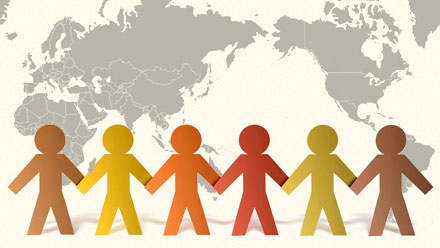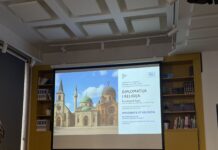Sunday, March 1st 2015

Over the past several days a debate has raged in the Public Diplomacy Council.
What gets such a calm, reserved group so fired up? The question: is there still a use and a utility – in our 21st century environment – for the term “public diplomacy?” As you will see, the debate goes well beyond semantics and into the nature and practice of what many of us have long called “public diplomacy.”
What follows is a very lightly edited version of the email exchanges. Comments on this subject are most welcome. But, read on:
February 24, 2015 at 8:34:38 AM EST from Matt Armstrong
I understand the conversation about August 31 continued positively after I had to drop off the Board call yesterday. I appreciate that the Board is entertaining the idea.
In this email, for the members of the board that were in the meeting and those that were not, I’d like to share some thoughts on why August 31 is important to ‘public diplomacy’.
Truman signed Executive Order 9608 on August 31, 1945. This order abolished the Office of War Information. The international information functions of both OWI and the Office of Inter-American Affairs (commonly referred to as Rockefeller’s office) were transferred to State. This included more than just a shortwave broadcasting system (which was not named Voice of America, a program on the network was referred to by that name). The State Department was now in charge of American libraries abroad, supplying of documentary and other news and information to our consulate posts abroad, and various cultural and educational affairs and exchange programs.
I personally feel that we — as public diplomacy supporters and scholars — should not look to OWI as the ‘foundation’ of U.S. ‘public diplomacy’ because it was involved in ‘psychological warfare’ abroad and filtering news about the war to Americans. The abolition of OWI and transfer of OWI’s information functions to State involved not a just a substantial reduction in jobs (the Assistant Secretary reduced the work force by some 8,000), but a substantial reshaping of the mission.
OWI was not instructed to defer to private organizations whenever possible. In the fields of information, and education and cultural affairs, State was instructed in the Executive Order (and in subsequent legislation) to defer to private organizations whenever the Secretary felt the private sector effort was adequate in cultural, educational, and information affairs. This instruction also reflected the (often) expressed intent of Members of Congress, two Secretaries of State (Byrnes and Marshall), and at least three Assistant Secretaries of State for Public Affairs (MacLeish, Benton, Allen). It was thus not imposed on State but invited. It was the “North Star” for a variety of programs.
August 31, 1945 was the first day for the State Department’s second Assistant Secretary of State for Public Affairs. William Benton was responsible for ushering in legislation that he later named the Fulbright Act, but also legislation later named the Smith-Mundt Act. (These two bills were complimentary and both could provide funds to different segments of an individual’s travel and experience.)
Benton restructured the news division, cultural and exchange divisions, and domestic public affairs. He played a key role in the establishment of UNESCO, including bringing on his predecessor Assistant Secretary (Archibald MacLeish) to provide a key role in US delegation, including writing the preamble to the UNESCO Charter.
One should not look at the Office of the Coordinator for Inter-American Affairs as a starting point for modern exchanges, as the State Department did with its initial release of the 75th Anniversary of Exchanges timeline a few weeks ago. The CIAA was established because FDR tired of the lack of action by the Bureau of Cultural Affairs in State. Further, if CIAA is seen as the precursor, then the Committee for Public Information’s Foreign Section takes the top slot when it established libraries and exchanges in 1918, and established the name United States Information Service.
As an aside, I’ve heard stories told that “USIS” was how USIA was known abroad because of potential misinterpretations of ‘Service’ and ‘Agency’ abroad. I would argue it was because USIS was already an established brand overseas for more than a decade before USIA was established. USIS was created by CPI, then CPI was abolished. USIS was re-established prior to WWII and continued on after Executive Order 9608.
In short, the establishment of modern ‘public diplomacy’ by the United States as an enduring activity, with the necessary support, appropriations, and authorities by Congress, the full-throated support of the Secretary of State and the President, as well as by the U.S. media (except the Associated Press), U.S. academia, and U.S. industry, began on August 31, 1945. That is the date we should commemorate.
Just a few thoughts. Best, Matt
February 24, 2015 at 4:32:09 PM EST from Hans “Tom” Tuch
I of course did not participate in the discussion regarding August 31 but consider that date entirely irrelevant, and especially the event represented by that date.
In the first chapter of Communicating with the World: U.S. Public Diplomacy Overseas I wrote “Whether one dates the beginning to the Sermon on the Mount, the seventeenth century Pontifical College for the Propagation of the Faith, the Declaration of Independence, President Truman’s “Campaign of Truth” or the founding of the Murrow Center at the Fletcher School of Law and Diplomacy in 1965, public diplomacy has been around for a long time.
It may not always have been accepted as an intellectual concept, as an academic discipline, or as a profession in which qualified Foreign Service officers engage. But as governments have come to realize that foreign relations can no longer be managed by traditional diplomatic practices alone, public diplomacy has become an imperative of a nation’s international life.”
In regard what you write about the Voice of America, I am afraid that Walter Roberts would turn in his grave. After lengthy research, he determined definitively that the Voice of American started on February 25 (I am fairly sure), 1942. Cheers, Tom
February 24, 2015 at 9:34:30 PM EST from Hans “Tom” Tuch
Re my earlier e-mail, a correction: the first U.S. Government broadcasts to Europe, according to the late Walter Roberts’ definite research, were on February 1, 1942.
February 26, 2015 at 11:52 a.m. from Morris “Bud” Jacobs
Tom and Matt, I’ve been following your discussion with interest.
I’ve come around to the view that the term “public diplomacy” may have outlived its usefulness.
Some of the problem comes with the “public” part of the term. It connotes “non-governmental” to some people. Indeed, in the current environment, it may be that public (that is, non-USG) international engagement is far more important than what the diplomats, in public or in private, may be saying.
To my way of thinking, communicating U.S. policy to foreign publics (the old “understand, engage, inform, and influence” formulation) is a sovereign function and a responsibility of government. Calling this activity “public” diplomacy muddies the waters a bit.
I’d like to see a new term emerge to describe this governmental communication function, and leave the term “public” diplomacy to non-governmental actors. But I don’t have any idea what that new term might be!
Cordially, Bud
Thursday, February 26, 2015 1:36:59 PM from Hans “Tom” Tuch
Bud, I disagree.
I maintain that public diplomacy is an apt and appropriate term for what we do: we, diplomats, deal with foreign publics–informing, influencing, educating, engaging them–
communicating with them. (All this in contrast to traditional diplomacy where diplomats– foreign offices– deal only with other diplomats.)
If one talks about all the other inter-societal elements that interact with one another (universities, organizations, individuals), I call it Intercultural Communications, a course that I taught at the University of Missouri in tandem with a course in Public Diplomacy.
Cheers, Tom
February 26, 2015 at 2:14:02 PM EST From Morris “Bud” Jacobs
Tom, we do disagree.
The model for “traditional” diplomacy has changed. Ambassadors no longer wait at the pier for the packet boat to bring them their latest instructions from Washington.
Rather, I think most ambassadors would agree that the majority of their time is spent conducting “public” or open diplomacy. While they may engage with host nation foreign ministries on some issues, they are rather more likely to be busy with open diplomacy, conveying the US policy message not to their counterparts in governments, but to their host nation publics. And although they may from time to time deliver demarches or other official communications, the reality is that they are no longer — in most circumstances — the most vital conduit of information from the USG to their official hosts.
If the President or Secretary of State wishes to communicate with a foreign counterpart, and if the issue is important or urgent enough, it is more likely he or she will simply pick up the phone and call — not the U.S. ambassador — but the foreign minister or prime minister with whom they may have business. If the U.S. ambassador is supported by a good bureau and desk he or she may be informed of these contacts after the fact. And sometimes, even that does not happen.
Similarly, other practitioners of “traditional” diplomacy at post are more involved with open or “public” diplomacy. Political officers speak at local universities or elsewhere. Consular officers speak (in person or on social media) about the ins and outs of visas. Commercial officers publicize US business opportunities, and so on and so forth. If the public affairs officer is on top of his or her game, the PAO’s primary role may be to manage all of this outreach, not to engage in direct open communication with host national audiences themselves.
This is not the model we grew up with, but I would say the PAO’s management function began to assume greater importance during the days of WorldNet and related programs, and it has grown dramatically since then. (Heck, I know of instances where the senior “public diplomat” cannot even oversee or guide the efforts of others at post — especially USAID — in their overall communication efforts.)
This fluidity or blurring of the lines between traditional and public diplomacy was perhaps one reason for Walter Roberts’ view that the time has come to do away with artificial bureaucratic arrangements such as “cones” in the Foreign Service.
I think he was right. We should step back, take a look at reality, and recognize that terms such as “public diplomacy” and bureaucratic “lanes” such as the public diplomacy “cone” have outlived their utility and no longer serve the interests of the United States.
Anyway, that’s my two cents, for what they are worth! Respectfully, Bud
February 26, 2015 4:53:50 PM EST from Hans “Tom” Tuch
Bud, we don’t really disagree. Ambassadors and other embassy officers recognize the fact that they along with public diplomacy-cone officers need to get out and communicate, advise, educate, inform– interact with foreign publics: i.e. conduct public diplomacy, ideally with the coordination and cooperation of the PAO.
I, as PAO, personally felt I had to get out and communicate with editors, educators, gate-keepers, give speeches and, above all, help the ambassador in his/her public diplomacy activities.

Brian E. Carlson
Board member
Summary: An experienced public diplomacy officer, Ambassador Brian Carlson advises the InterMedia research organization on military and foreign affairs issues and serves the State Department as a senior inspector. For the last three years he was the State Department liaison to the Department of Defense on strategic communication.
…click authors name for more info
Author: Brian Carlson
We welcome comments from our readers that advocate and shed light on the subject of public diplomacy. We avoid discussion that is politically partisan, commercial in nature or offensive. To prevent inappropriate comments and spam we screen each comment before publishing it, so please excuse us if you do not see your remark right away.













